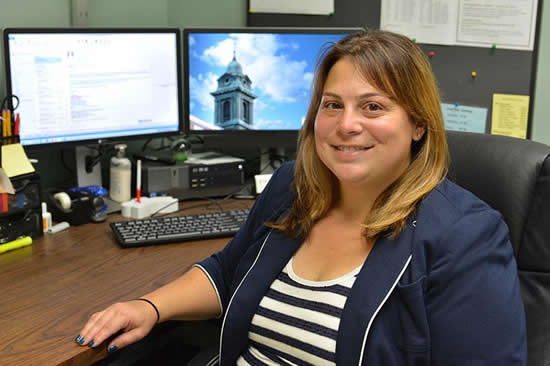Community Voices: Jaclyn Schildkraut
Jaclyn Schildkraut is an Assistant Professor of Public Justice at the State University of New York (SUNY) at Oswego, and a national expert on mass shootings research. Her research focuses on school and mass shootings in the United States in regard to crime statistics, media representations, security and prevention, legislative responses, and other important considerations that impact individuals and communities struck by these tragedies. She has been published in numerous academic journals, and her research has been cited by the news media locally, nationally, and even internationally.

Along with her research partner H. Jaymi Elsass, Jaclyn released a book entitled Mass Shootings: Media, Myths, and Realities. This book provides a critical examination of mass shootings as told by the media, and investigates common myths about these tragic events.
She took some time out of her busy schedule to talk to us about recent events, myths of mass shootings, and what we can all do to make a difference.
Specifically, Jaclyn shared current projects that she is working on now — advocating No Notoriety, conducting interviews with survivors of mass shootings, and remembering the victims of these tragedies.
Jaclyn is an advocate for the No Notoriety campaign, which was founded by Tom and Caren Teves immediately following the murder of their son, Alex Teves, by a mass killer. Alex was one of 12 individuals killed and over 70 shot and injured in the Aurora theater shooting on July 20, 2012. The goal of No Notoriety is to challenge the media to limit the name and likeness of the perpetrator in media reporting after initial identification — except when the alleged assailant is still at large and in doing so would aid in the assailant’s capture. They ask the media to not broadcast or publish self-serving statements, photos, videos, or manifestos made by the individual. In addition, No Notoriety encourages the media to elevate the names and likenesses of all victims killed or injured to send the message their lives are more important than the perpetrator’s actions.
Research finds that the prospect of infamy could serve as a motivating factor for other individuals and inspire copycat crimes. In fact, Jaclyn’s research related to No Notoriety finds that 80% of news consumers believe there is a copycat effect. No Notoriety asks the media to keep this responsibility in mind when reporting — recognizing that the individual’s name and likeness is irrelevant to media coverage of such acts unless the alleged assailant is at large.
Jaclyn focuses on providing empirical evidence to support that No Notoriety is effective. She promotes No Notoriety online, in media interviews and written work. She recently had this related article published by Vox, “The Media Should Stop Making School Shooters Famous.”
The second focus of Jaclyn’s recent work is on victims and survivors of mass shootings. She has spent the past four months interviewing 35 survivors of mass shootings in order to understand their needs as it relates to recovery. Although this work is painful and emotional, she feels it’s critical to helping survivors of mass shootings. “If you want to understand their needs as it relates to recovery,” Jaclyn says, “just ask.”
After the shooting at Marjory Stoneman Douglas, Jaclyn began sharing the stories of each of the victims on her Facebook page. She meticulously gathers information about each victim, and shares their stories in a way that honors their memory in a profound and meaningful way. Her posts have been liked and shared thousands of times, elevating the names and likeness of the victims of this horrible tragedy.
We asked Jaclyn, based on her research and expertise, if she could share with us some of the myths that we have as a society about mass shootings. “If I could sum it up,” Jaclyn says, “the biggest myth is that mass shootings can be prevented by focusing solely on guns, solely on mental health, or solely on some other causal factor — whether that’s violent media, child rearing, whatever the case may be. The fact of the matter is mass shootings are complex, multi-dimensional phenomena. Attempting to try to shove them in very black and white, one or the other boxes — it doesn’t work.”
She continues, “What this most recent shooting at Marjory Stoneman Douglas has highlighted is that we have a much bigger issue than just guns or just mental health. We have a huge issue of systems failures.”
Jaclyn adds, “I am a researcher. I don’t get into debate. I present the evidence, and let other people figure out the solutions.”
In fact, Jaclyn’s research and expertise are contributing to both local and national discussions, and helping to find solutions to the issue of mass shootings in our country. Specifically, Jaclyn is currently participating in multiple task forces — the Gun Violence Researchers of the Rockefeller Institute of Government, the Governor’s School Safety Taskforce in Syracuse, NY, and Governor Andrew Cuomo’s newly formed “States For Gun Safety Coalition” (which included the governors of Connecticut, New Jersey and Rhode Island).
In conclusion, we asked Jaclyn for advice on what we can do as individual citizens to make a difference as it relates to gun violence. She recommends we focus on the following: put pressure on media regarding no notoriety, look for warning signs within our own communities and organizations, talk to our schools about security measures, and change our focus to proactive rather than reactive solutions.
Finally, Jaclyn recommends we “pick which solution makes the most sense to you and do something.”
“If we all do our part, we can make a difference.”
You can find out more about Jaclyn’s work on her website and by following her on Facebook.